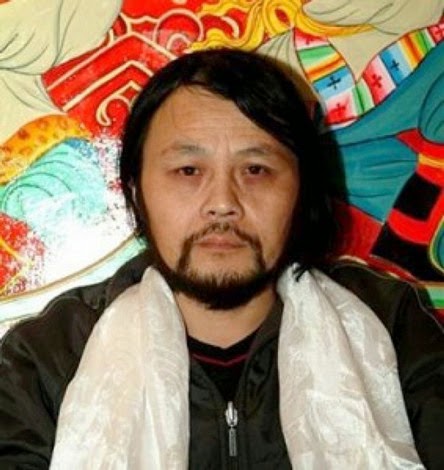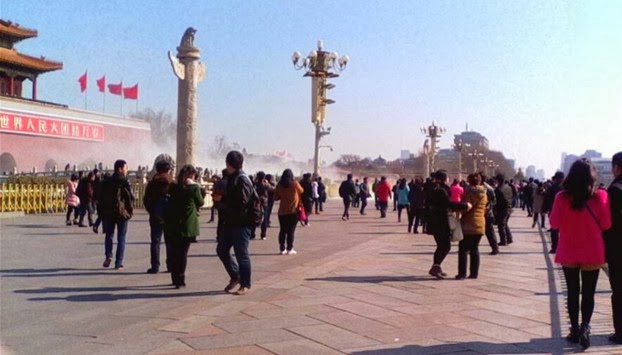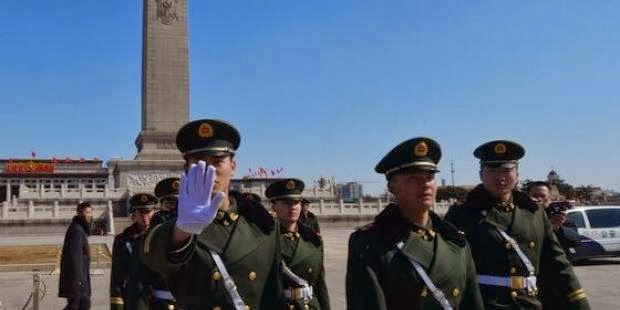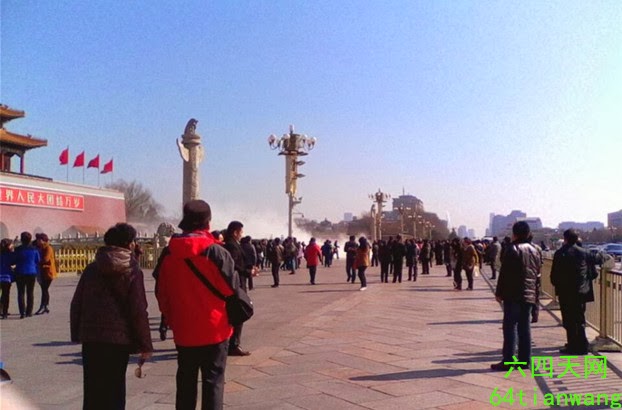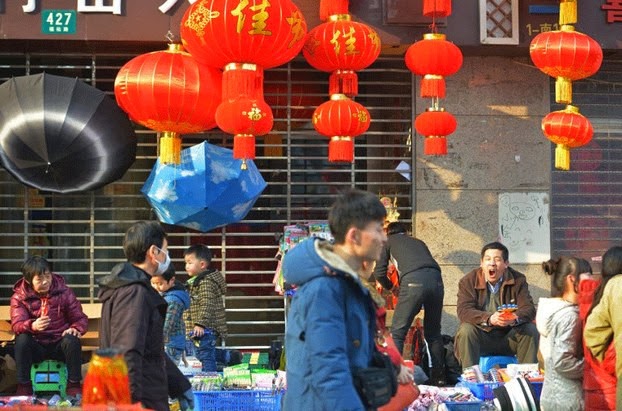[ 时间:2014-03-06 09:58:14 | 作者:FRA | 来源:六四天网转载 ]
2014-03-05
Smoke is seen in Tiananmen Square at the site where eyewitnesses said a woman self-immolated on March 5, 2014.Photo courtesy of Tianwang website
A woman set fire to herself in Beijing's Tiananmen Square on the opening day of China's annual session of parliament on Wednesday, but evidence of her protest was swiftly expunged from the scene, according to eyewitnesses.
As Premier Li Keqiang announced a rise in the domestic security, or "stability maintenance," budget to 205 billion yuan (U.S. $33 billion) at the session inside the Great Hall of the People, police were rushing to save the life of the unidentified woman outside who already had severe burns.
Beijing-based activist Wang Jing said she saw police and a water truck rush in to extinguish the flames on the woman at around 11:00 a.m. Wednesday, sending a plume of smoke into the sky near Tiananmen Gate.
"There was smoke coming from near the Jinshui Bridge, and I ran over to see what was happening," Wang told RFA in an interview.
"I saw white stuff [extinguisher foam] everywhere; you couldn't see the person, and then they started to clear the area and the police wouldn't let people take photos," she said.
She said police had snatched her cell phone after she began recording video on it.
Wang said an eyewitness who was closer than she was said that the person covered in foam was a woman in her forties, and that a group of police officers had appeared very soon after she caught fire, and put out the blaze with fire extinguishers.
"The young man said she set light to herself as soon as she opened her coat," Wang said, adding that the woman was carried away by police after the flames were extinguished.
Photos supplied by Wang to the Sichuan-based Tianwang rights website showed a white plume of smoke near the main arch of the Tiananmen Gate.
Swift response
Wang said a second team had arrived soon after the police to wash the extinguisher foam from the paving stones.
"They dealt with it very fast," she said. "All the foam was washed clean, although there were slight traces of white on the ground."
"The water truck came and hosed it down.... It all took around 30 minutes," Wang added.
Eyewitness reports suggest the woman may have been alive, but severely burned, when taken from the scene.
A second eyewitness, Tianjin-based rights activist Han Lianru, said she saw a policeman grab the petrol can from the woman, saying, "Look, you've burned your face."
"She had red burns on her face caused by the fire," Han said. "I thought she was in her thirties. She was pretty thin."
Eyewitnesses did not say why the woman had set herself on fire.
The last person reported to have self-immolated in the square was a man that Beijing authorities said was from Hubei and set himself on fire in front of the Jinshui Bridge in October 2011.
Leafleters detained
The number of ordinary Chinese traveling to Beijing to pursue grievances against the government typically swells ahead of key political events, as petitioners hope their cases will get a more sympathetic hearing.
Instead, many say they are repeatedly stonewalled, detained in "black jails," beaten, and harassed by the authorities if they try to petition a higher level of government.
Han said police had also detained hundreds people who were handing out leaflets on the square as the ruling Chinese Communist Party leadership convened in the Great Hall of the People a few hundred meters away.
"There were several hundred people outside [the parliament]," said Tianjin-based rights activist Han Lianru, speaking from inside the Tiananmen Square branch police station.
"Everyone who comes here is being detained," she said, adding that around a dozen people were being held alongside her in the police station.
"There were several hundred people ... who have all been taken to branch police stations and to Majialou," Han said, referring to an unofficial detention center on the outskirts of Beijing used for rounding up those who come to the capital to complain about their local government.
A second Tianjin petitioner, Zhang Guangrui, said he had been detained for handing out leaflets complaining about a grievance against his local government that remained unaddressed, but had managed to escape before being locked up.
"I escaped," Zhang said. "Plainclothes, armed police and special police pinned me to the floor, and took me down to the Tiananmen branch station, and were about to send me off to Majialou."
"But I slipped away when they weren't paying attention," he said.
Henan petitioner Xing Jian said police had set up several security checkpoints for people approaching Tiananmen Square, and seemed keen to ensure reports of the incident didn't go any further.
"I heard a tourist say someone had self-immolated, and ... I managed to get photos of the police looking through people's cell phone photos," Xing said.
Reforms pledged
As the drama outside unfolded, Premier Li told NPC delegates the party planned to reform the system of handling public complaints.
"We shall reform the institutions for public grievance redress, resolving social conflicts in situ promptly," Li told delegates.
Beijing has repeatedly tried to stem the flood of thousands of petitioners who descend on the capital with complaints, ordering that grievances should be dealt with in the province where they originate.
But petitioners say corrupt networks of power and influence at local level ensure that a fair hearing is all but impossible.
However, Li also vowed to improve legal education among ordinary people. Petitioners say "legal study class" is a byword for extra-judicial detention.
"We shall adopt common education in law in an in-depth manner, and increase legal assistance," he said.
Petitioner protests
China's army of petitioners files nearly 20,000 grievances in person every day to complaints offices across the country, according to official figures released last week.
The government's complaints website currently receives around 1,200 complaints on any working day online, many of them linked to forced evictions.
Last December, 13 protesters staged a mass suicide attempt in Beijing after a failed bid to win compensation over forced eviction from their homes.
In a protest timed to coincide with World Human Rights Day, the group drank pesticide simultaneously in protest at their forced eviction three years ago in the central Chinese city of Wuhan.
Violent forced evictions, often resulting in deaths and injuries, are continuing to rise in China, as cash-strapped local governments team up with development companies to grab property in a bid to boost revenue, according to a recent report by rights group Amnesty International.
Amnesty International collected reports of 41 cases of self-immolation from 2009 to 2011 alone due to forced evictions. That compares to fewer than 10 cases reported in the entire previous decade.
Reported by Qiao Long and Xin Yu for RFA's Mandarin Service and by Hai Nan for the Cantonese Service. Translated and written in English by Luisetta Mudie.
"They dealt with it very fast," she said. "All the foam was washed clean, although there were slight traces of white on the ground."
"The water truck came and hosed it down.... It all took around 30 minutes," Wang added.
Eyewitness reports suggest the woman may have been alive, but severely burned, when taken from the scene.
A second eyewitness, Tianjin-based rights activist Han Lianru, said she saw a policeman grab the petrol can from the woman, saying, "Look, you've burned your face."
"She had red burns on her face caused by the fire," Han said. "I thought she was in her thirties. She was pretty thin."
Eyewitnesses did not say why the woman had set herself on fire.
The last person reported to have self-immolated in the square was a man that Beijing authorities said was from Hubei and set himself on fire in front of the Jinshui Bridge in October 2011.
Leafleters detained
The number of ordinary Chinese traveling to Beijing to pursue grievances against the government typically swells ahead of key political events, as petitioners hope their cases will get a more sympathetic hearing.
Instead, many say they are repeatedly stonewalled, detained in "black jails," beaten, and harassed by the authorities if they try to petition a higher level of government.
Han said police had also detained hundreds people who were handing out leaflets on the square as the ruling Chinese Communist Party leadership convened in the Great Hall of the People a few hundred meters away.
"There were several hundred people outside [the parliament]," said Tianjin-based rights activist Han Lianru, speaking from inside the Tiananmen Square branch police station.
"Everyone who comes here is being detained," she said, adding that around a dozen people were being held alongside her in the police station.
"There were several hundred people ... who have all been taken to branch police stations and to Majialou," Han said, referring to an unofficial detention center on the outskirts of Beijing used for rounding up those who come to the capital to complain about their local government.
A second Tianjin petitioner, Zhang Guangrui, said he had been detained for handing out leaflets complaining about a grievance against his local government that remained unaddressed, but had managed to escape before being locked up.
"I escaped," Zhang said. "Plainclothes, armed police and special police pinned me to the floor, and took me down to the Tiananmen branch station, and were about to send me off to Majialou."
"But I slipped away when they weren't paying attention," he said.
Henan petitioner Xing Jian said police had set up several security checkpoints for people approaching Tiananmen Square, and seemed keen to ensure reports of the incident didn't go any further.
"I heard a tourist say someone had self-immolated, and ... I managed to get photos of the police looking through people's cell phone photos," Xing said.
Reforms pledged
As the drama outside unfolded, Premier Li told NPC delegates the party planned to reform the system of handling public complaints.
"We shall reform the institutions for public grievance redress, resolving social conflicts in situ promptly," Li told delegates.
Beijing has repeatedly tried to stem the flood of thousands of petitioners who descend on the capital with complaints, ordering that grievances should be dealt with in the province where they originate.
But petitioners say corrupt networks of power and influence at local level ensure that a fair hearing is all but impossible.
However, Li also vowed to improve legal education among ordinary people. Petitioners say "legal study class" is a byword for extra-judicial detention.
"We shall adopt common education in law in an in-depth manner, and increase legal assistance," he said.
Petitioner protests
China's army of petitioners files nearly 20,000 grievances in person every day to complaints offices across the country, according to official figures released last week.
The government's complaints website currently receives around 1,200 complaints on any working day online, many of them linked to forced evictions.
Last December, 13 protesters staged a mass suicide attempt in Beijing after a failed bid to win compensation over forced eviction from their homes.
In a protest timed to coincide with World Human Rights Day, the group drank pesticide simultaneously in protest at their forced eviction three years ago in the central Chinese city of Wuhan.
Violent forced evictions, often resulting in deaths and injuries, are continuing to rise in China, as cash-strapped local governments team up with development companies to grab property in a bid to boost revenue, according to a recent report by rights group Amnesty International.
Amnesty International collected reports of 41 cases of self-immolation from 2009 to 2011 alone due to forced evictions. That compares to fewer than 10 cases reported in the entire previous decade.
Reported by Qiao Long and Xin Yu for RFA's Mandarin Service and by Hai Nan for the Cantonese Service. Translated and written in English by Luisetta Mudie.







